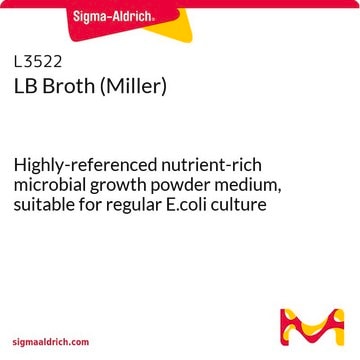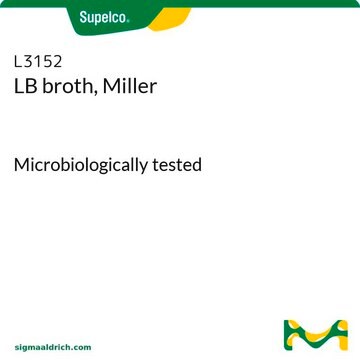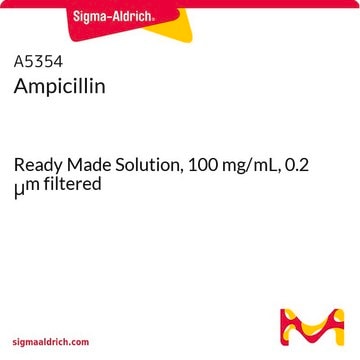L2542
LB Broth (Miller)
Liquid microbial growth medium
Synonym(s):
Luria Broth Miller, Luria-Bertani broth, Miller
Sign Into View Organizational & Contract Pricing
All Photos(1)
About This Item
UNSPSC Code:
41106200
NACRES:
NA.85
Recommended Products
grade
for molecular biology
Quality Level
sterility
sterile; 0.2 μm filtered
form
liquid
technique(s)
microbiological culture: suitable
pH
6.5-7.2
application(s)
microbiology
storage temp.
room temp
suitability
nonselective for Escherichia coli
nonselective for coliforms
General description
Miller’s LB is a highly-referenced microbial growth medium used for the cultivation of E. coli. This nutrient-rich microbial broth contains peptides, amino acids, water-soluble vitamins, and carbohydrates. It enables fast growth, improves growth yields for various bacterial species, and can retain the hydrophilic behavior of samples for longer periods.
Application
LBBroth (Miller) is suitable for:
- non-selective cultivation of E. coli strains for cloning, DNA plasmid production and production of recombinant proteins.
- selective cultivation when appropriate antibiotics are added.
- the cultivation of E-coli cells for anti-bacterial assays.
Features and Benefits
Miller′s LB liquid provides:
- Filter-sterilized, ready-to-use format
- Convenient package size
- Standard formulation
Components
10g/L Tryptone
10 g/L NaCl
5 g/L Yeast Extract
10 g/L NaCl
5 g/L Yeast Extract
related product
Product No.
Description
Pricing
Storage Class Code
12 - Non Combustible Liquids
WGK
nwg
Flash Point(F)
Not applicable
Flash Point(C)
Not applicable
Personal Protective Equipment
dust mask type N95 (US), Eyeshields, Gloves
Certificates of Analysis (COA)
Search for Certificates of Analysis (COA) by entering the products Lot/Batch Number. Lot and Batch Numbers can be found on a product’s label following the words ‘Lot’ or ‘Batch’.
Already Own This Product?
Find documentation for the products that you have recently purchased in the Document Library.
Customers Also Viewed
Long-term retention of hydrophilic behavior of plasma treated polydimethylsiloxane (PDMS) surfaces stored under water and Luria-Bertani broth
Zhao LH, et al.
Sensors and actuators A, Physical, 181.0, 33-42 (2012)
Use of the Yeast Pichia pastoris as an Expression Host for Secretion of Enterocin L50, a Leaderless Two-Peptide (L50A and L50B) Bacteriocin from Enterococcus faecium L50
Antonio Basanta, Beatriz Gomez-Sala, et al.
Biotechnology, 76, 3314-3324 (2010)
Celine Abueva et al.
International journal of biological macromolecules, 182, 1713-1723 (2021-05-30)
The importance of developing more potent antimicrobials and robust infection prevention practices has been highlighted recently with the increase in reports of emerging bacterial resistance mechanisms and the development of antibiotic-resistant microbes. In this study, a quaternary ammonium chitosan derivative
Felix Wezel et al.
International journal of molecular sciences, 22(6) (2021-04-04)
Invasive urothelial carcinomas of the bladder (UCB) characteristically show a loss of differentiation markers. The transcription factor Grainyhead-like 3 (GRHL3) plays an important role in the development and differentiation of normal urothelium. The contribution to UCB progression is still elusive.
Prapassorn Bussaman et al.
Journal of Zhejiang University. Science. B, 13(4), 261-266 (2012-04-03)
Xenorhabdus bacterium has been used as a biological control agent against Luciaphorus sp., a mushroom mite endemic in Thailand. To develop an effective formulation of Xenorhabdus stokiae, treatments using different parts of X. stokiae isolate PB09 culture, including whole cell
Our team of scientists has experience in all areas of research including Life Science, Material Science, Chemical Synthesis, Chromatography, Analytical and many others.
Contact Technical Service












